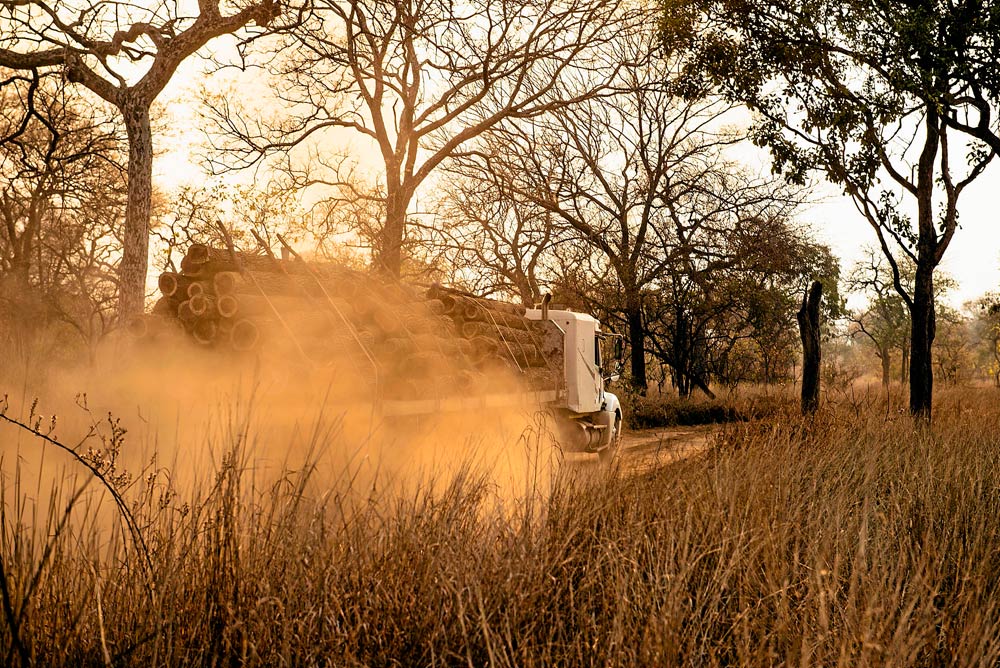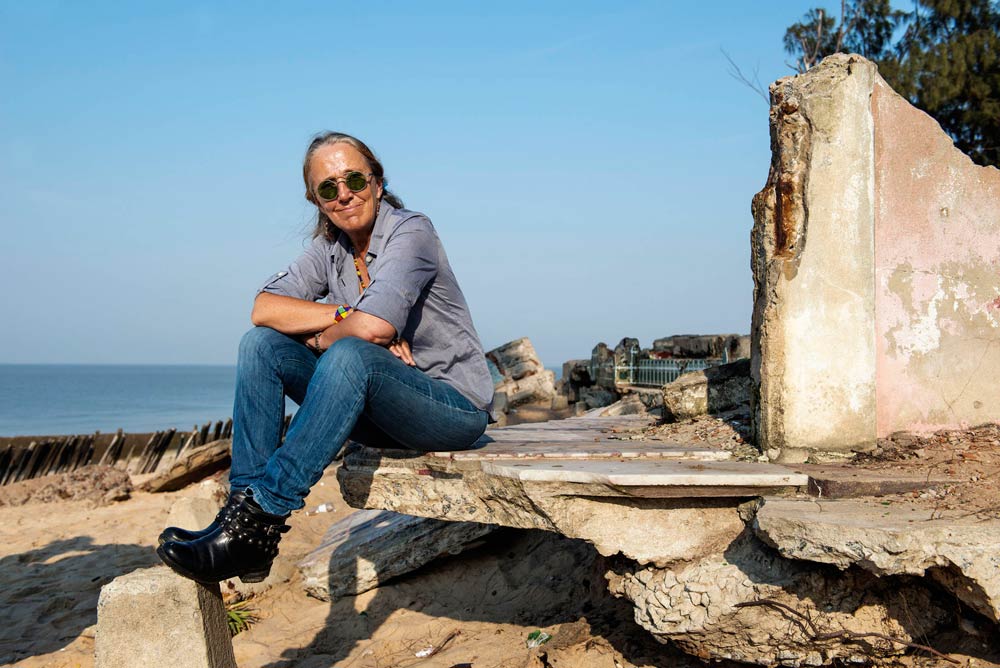Mozambican Pedro Abilio plies his new trade with his chainsaw
Nito Silva wipes the wood shavings from his sweaty face while his chainsaw still growls. “I log about 40 trees per day,” he says, leaning on a tree he has just cut. The 45-year-old Mozambican, dressed in a grubby T-shirt, torn trousers and scuffed shoes, cuts trees illegally – not wearing a helmet, ear protection or safety glasses. Hundreds of tree stumps around him are proof of his hard labour.
Silva used to be a farmer growing cassava, corn and beans. Eight years ago, Chinese businesspeople visited the area and offered him a high salary for cutting down trees. They lent him a chainsaw and now come by weekly to pick up the trunks by truck, taking a bumpy 60km dirt road.
He knows what he’s doing is illegal. “But what else can I do? When I was a farmer I earned almost nothing and I have to feed seven children.”
He and his two helpers earn between 160 and 300 Mozambican meticais (between R60 and R100) a tree, depending on the type of wood. The Chinese sell the rare exotic hardwood trees such as chanate, ebony, monzo (leadwood), panga panga, pau preto and wenge for a hundred times as much back in their home country. Still, Silva’s income isn’t bad in a country like Mozambique, where more than half of the population lives below the poverty line and monthly salaries rarely exceed 3 000 meticais (just over R1 000).
Other Mozambican loggers earn less. The 28-year-old Pedro Abilio, for example, receives 2 500 meticais (about R900) for each truck of 80 logs he delivers. He loses some of this money because he officially works for a Mozambican intermediary. The wood, however, is handled directly by the Chinese, who pick up the logs every week using seven trucks that come all the way to Abilio’s remote village in the middle of the forest in Tete province.
Like Silva and Abilio, many Mozambicans are illegally logging for Chinese companies. Often, in the beginning, the Chinese lend them the money to buy equipment such as a chainsaw, locking them into dependency and forcing them to continue cutting to be able to pay off their debts. By buying from individual Mozambicans, the Chinese avoid the high costs of obtaining a logging licence and the obligation to replant trees.
“If Chinese companies would respect the rules, they would only make about 10% profit,” says Ana Alonso (65), a Spanish writer who has been campaigning against illegal logging in Mozambique for more than 20 years. According to her, bribing officials instead of paying taxes leads to a 50% increase in profits.
Moving trees
“If we get pulled over by the police, we give them some money so we can continue our journey,” a smiling “Mr Huo” says as he introduces himself. The 53-year-old Chinese businessperson, who looks like a cowboy in a green camouflage jacket and a grey hat, is the boss of Yixing Madeira, one of the many Chinese timber companies located along the main road to Beira.

Laden: The roads to Beira are filled with trucks, many of which are driven by Chinese businessmen, carrying illegally harvested logs. But police and politicians often look away for a price. (Jeroen van Loon)
On our way to this port city, we pass dozens of trucks piled with logs, often driven by Chinese businesspeople. Tens of thousands of tree trunks, heaped into high mountains, sit waiting on the compounds to be shipped to China, revealing the enormous rate at which the Chinese are emptying the Mozambican primeval forests.
Deforestation
Illegal deforestation is happening in a similar way in countries such as Congo-Brazzaville, the Democratic Republic of Congo, Guinea-Bissau, Cameroon, Gambia, Madagascar, Russia, Indonesia, Myanmar, Laos and Vietnam.
According to Greenpeace, this deforestation will affect not only global warming but also the amount of rainfall.
“Deforestation in the Amazon and Central Africa was directly causing reduced rainfall in the United States Midwest during the growing season,” Greenpeace states in a recent report. “And complete deforestation of the African Congo Basin is predicted to intensify the West African monsoon, while increasing temperatures of between 2?C and 4?C and reducing rainfall by up to 50% in the entire region,” the organisation adds.
According to Huo, 120 wood-filled containers measuring 20m3 each depart every week from Beira to China. Because since 2007 many types of first-class wood are no longer allowed to be exported as tree trunks, and have to be processed in Mozambique to create more jobs, Huo simply cuts the logs in half using a machine.
“This way more wood can fit into the container as well,” he chuckles while he offers us bottles of mineral water and lights a cigarette.
Strip and move on
We are not allowed to take pictures of the Mozambican workers who are unloading the trucks full of logs that have just arrived, using a forklift truck.
Huo says candidly that he prefers to buy wood from individual Mozambicans because this allows him “to make more profit”. It doesn’t bother his conscience. “All rangers, police officers and politicians are criminals over here,” he says.
He relates that rangers showed up on his doorstep recently, offering to sell him illegally logged trees. Huo laughs loudly when we ask what he’s going to do when there’s no wood left in Mozambique. “Move to the next country where there’s still wood, obviously.”
Huo is totally convinced that Mozambique will be stripped of all its hardwood forests “within just a few years”.
Death threats
“While this ecological disaster is taking place in Mozambique, the international community doesn’t seem to care much,” Alonso says.
She’s convinced that the deforestation will negatively influence global warming. “Although less well known than the forests in the Amazon region, these forests also make up the lungs of this Earth.”

Battle: Spanish writer Ana Alonso has been campaigning against illegal logging in Mozambique for more than 20 years. (Jeroen van Loon)
But leaving the hardwood forests completely untouched would be impossible, according to her. “There are people living there. They have to support themselves.”
That’s why, since the 1990s, she has run a forest of 60 000 hectares in which she and her workers harvest and replant trees in a controlled manner.
“That’s the best way to protect a tropical hardwood forest,” she says.
Although Alonso pays her taxes, she alleges that the Mozambican government tries to block what she is doing “in all possible ways”. She claims that her forest licence, for example, was revoked for unclear reasons in 2010 and she only got it back after a two-year battle. She has also had to employ private security guards since receiving anonymous death threats.
Mozambican authorities did not respond to requests for comment.
“Several Mozambican politicians and officials are quickly becoming rich thanks to the Chinese bribes, while the inhabitants of the forest remain desperately poor,” Alonso sighs.
According to Mozambican law, local communities should receive 20% of the tax charged on Alonso’s logged trees. But according to her, this money doesn’t flow back to them at all.
‘Bribery and corruption’
The British Environmental Investigation Agency also blames corrupt Mozambican politicians for the illegal logging. In a recently published report, the research institute quotes Chinese timber traders explaining to undercover researchers how to get assistance from Mozambican MPs and the country’s current minister of agriculture, José Pacheco, who has been tasked with counteracting illegal logging.
Pacheco refused to comment on the report.
The agency calculated that 93% of all logging in Mozambique has been illegal in recent years, making use of Mozambican export and Chinese import numbers. Most of the hardwood was shipped to China. China itself banned commercial logging in 1998.
Since 2013, Mozambique has been China’s biggest wood supplier on the African continent. Because of illegal timber exports, the country has lost about €113?million in tax revenues since 2007, the agency calculated – money that could have financed Mozambique’s national forest programme for 30 years.
The agriculture ministry does sometimes fine Chinese timber firms, but to Alonso actions like these are nothing but symbolic politics. “The fines are a joke compared to the
millions that the illegal businesspeople make. Civil society should take action and shouldn’t accept this any longer.”
Local environmental organisation Forum Terra leads by example. It makes communities aware of their rights and helps them to establish committees to prevent businesspeople from bribing local leaders.
They are also urged to pull over trucks carrying illegally harvested timber. “They should call the local authorities; half of the fine should be paid directly to the local community,” Forum Terra’s Manuel Passar explains.
Meanwhile, illegal logger Silva has been noticing the significant decrease in the number of valuable hardwood trees in his area. He doesn’t really care though, he says, while pouring new petrol into his chainsaw. “When all trees are gone, I will burn everything down to create farmland and will plant corn and pineapples.”